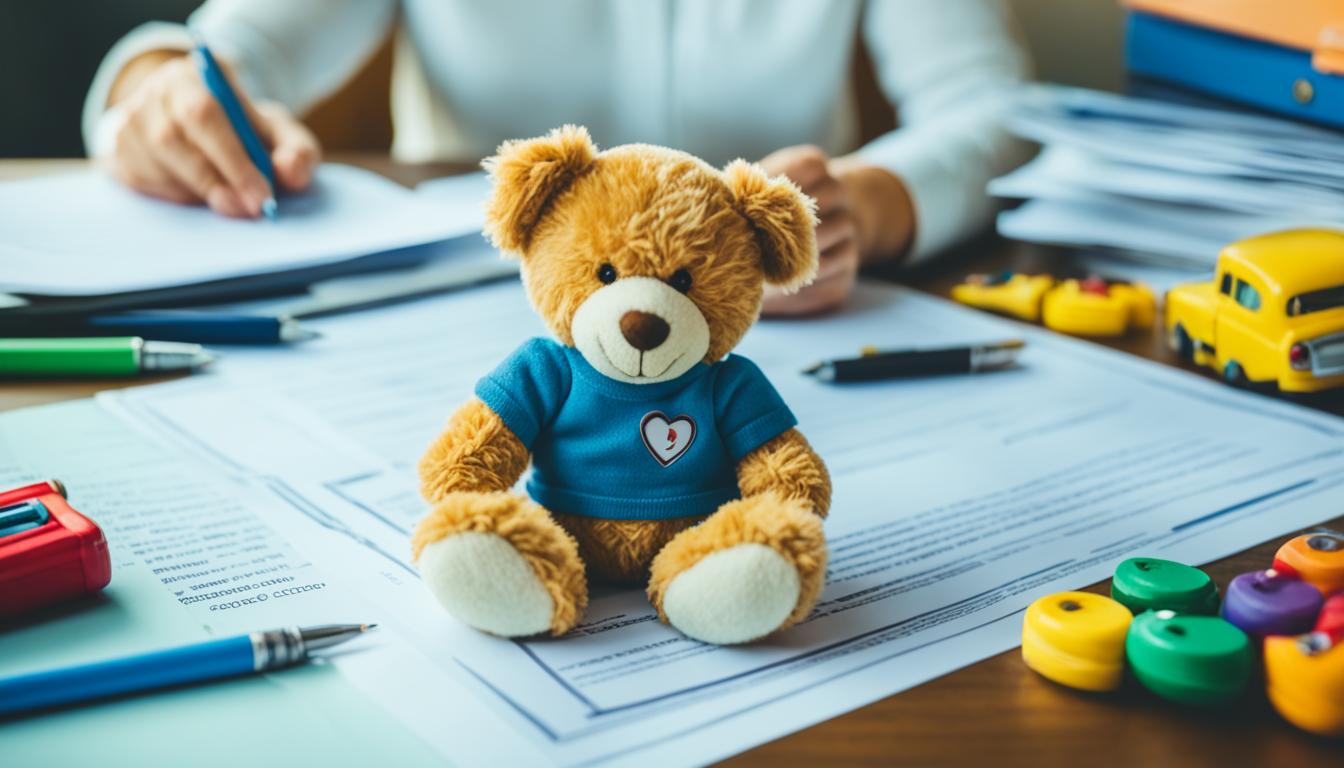As a parent in a custody battle, mediation can be hard and sad. It’s important to know what not to say in these talks. This can really help you get what’s best for your child. You might ask, What mistakes should I avoid in child custody mediation?
Let’s look at important talking points, good things to say, and tips for getting ready. These can give you more self-assurance and control during mediation. Understanding what not to do and thinking about your child first can help. This way, you may find a solution that works well for your child.
Key Takeaways
- Avoid using possessive language and focusing on personal issues during mediation.
- Maintain a calm and composed demeanor, and utilize effective communication strategies like active listening.
- Prepare thoroughly by gathering necessary documents and rehearsing your presentation.
- Respect the mediator’s role and consider seeking legal representation for guidance.
- Address difficult situations objectively and focus on implementing the agreement effectively.
Understand the Purpose of Mediation
Child custody mediation helps parents decide on custody and obligations fairly and quickly. It aims to have everyone talk honestly and openly but without sharing what’s said outside the room. The mediator guides parents to solve their problems in ways that put the kids first.
Focusing on the Child’s Best Interests
Mediation gets parents to agree on custody and visitation they both can accept. It’s all about making sure the child’s well-being is the main focus.
Promoting Amicable Solutions
Mediation is a way for parents to find friendly solutions that help their child. It tries to stop parents from fighting in court, which is very hard on everyone.
Avoiding Contentious Court Battles
It’s a better, cheaper way to settle disagreements than going to court. The goal is to get parents to talk and come up with a plan that’s good for their child.
Common Mistakes to Avoid
It’s key to stay away from common errors in child custody mediation. These mishaps can slow your progress and lead to bad outcomes. Knowing what to avoid helps parents come to mediation with a better mind. This increases the chance of a good agreement that puts the child first.
Focusing on Personal Issues
Don’t get stuck on your own issues during mediation. It’s okay to feel strongly during a divorce or separation. But, the talks should be about the child, not the parents’ problems. Focus on making a good co-parenting plan. This is essential for the mediation’s success.
Using Aggressive Language or Behavior
Using tough words or actions in mediation is a big mistake. The right way demands that parents stay calm and kind, even if they disagree. Bad behaviors like yelling or insults make things worse. It creates a bad atmosphere and can ruin the cooperation.
Making Unreasonable Demands
Also, be careful not to ask for too much during mediation. This means not asking for things that go against the child’s benefit or the other parent’s rights. The right approach is to be open to compromise. This helps in finding solutions that work for everyone.
Avoid these mistakes and focus on using the right language and communication. This way, parents can follow the co-parenting guidelines better. They can make an agreement that’s good for their child’s happiness.

Phrases to Avoid During Mediation
When you talk during child custody mediation, watch your words. Saying certain things can slow things down and cause more fights. It’s best not to talk about “my child” like you own them. Also, try to skip bringing up old mistakes and fights. This way, everyone can focus on what’s best for the child. It helps make talking with the other parent more positive.
Possessive Language
Using phrases that show you own or decide for the child is not helpful. Instead, talk in a way that shows you both are parents. For example, say “our child” or “the children’s time.” This shows that you want to work together. It’s about what’s good for the child, not what each parent wants.
Bringing Up Past Mistakes
Always talking about old fights slows down the talking and makes it harder to agree. It is better to work together on new solutions that help the child now. Don’t focus on who was wrong. Focus on making things better now for the child. This makes talking with the other parent more helpful and positive.
Discussing Parental Rights
It’s good to know your parent rights, but too much talk about this can take the focus off the child. It is better to talk about what the child needs. See how you can share the child’s time in a way that really helps them. talking this way can make things better for everyone involved.
Thinking about what you say and avoiding these issues can make the talks more about the child. This can help everyone agree on what’s best for the kid.
Effective Communication Strategies
Being good at communication is key during child custody talks. Parents should focus on listening well, staying calm, and talking about their feelings without blame. These steps make conversations better and help focus on what’s best for their child.
Active Listening
Active listening means really paying attention to the other parent. It’s about understanding their point of view and showing you get their worries. This kind of listening is a sign of respect and trust. It helps sort out the real issues in the custody problem. Listening carefully helps you meet the other parent’s concerns and find solutions that work for everyone.
Staying Calm and Composed
Custody talks can get pretty emotional. But it’s crucial not to lose your cool. Yelling, using mean words, or fighting won’t help. It just makes things worse. Staying calm and focused on the child helps keep the talks on the right path.
Using “I” Statements
Talking with “I” statements is better than “you” statements. For instance, say “I worry about our child’s future with this choice” instead of “You don’t care about what our child needs.” Using “I” is about sharing your feelings without blaming. It can make discussions less stressful and more open.

what not to say in child custody mediation
As you go through child custody mediation, choose your words carefully. The language you use and how you say things matters. This can make the mediation successful, focusing on the child’s best interests.
Avoid using words that show you own the child. Words like “my child” or “your child” make things sound like a fight. Instead, say “the child” or “our child” to show you both take care of the child.
Don’t bring up old mistakes or focus on what the other parent did wrong. It’s easy to want to show how good you are. But, talking about the other parent’s mistakes makes things hard. Instead, talk about what’s happening now. Focus on what’s the best for the child.
Avoid talking about your rights in the mediation. This puts the focus on the parents, not the child. Talk about what the child needs. Find new ways to parent together that both of you can agree on.
Watch your words, keep the child’s interest first, and work on finding solutions. This way, you can handle child custody mediation with care and respect for everyone involved.

Preparation and Presentation
Getting ready for a child custody mediation is key. You need to have important papers ready, wear the right clothes, and practice what you want to say. This way, you’ll feel sure and boost your chances of a good outcome for your child.
Gathering Necessary Documents
Before heading to the meeting, gather papers that back up your side. This could be about money, who has the child when, and how the other parent acts. Having these papers in order shows you’re serious and helps the mediator know the whole story.
Dressing Appropriately
How you look at the meeting matters a lot. Dressing nicely shows you take things seriously. Make sure your clothes are neat and respectful. This makes it easier to share what you think and want, without anything distracting.
Rehearsing Your Presentation
Practice what you’re going to say to the mediator. Talk about why you think your way is best for the child. Offer some solutions that make sense. This practice helps you say everything clearly and shows you’re ready to help make things better.
Maintaining a Positive Attitude
Keeping a positive attitude in child custody mediation is very important. It makes things more constructive. Also, it shows you care about your child’s needs the most. By focusing on the good parts of mediation, you might agree in a way that’s good for your child.
Avoiding Negative Comments
Avoid bad talk about the other parent. Don’t use blame or harsh words. Talk in a nice way about the child. Show you want to work together for your child’s good.
Highlighting Positive Traits
Talk about how good you are at being a parent. Give clear examples. This will make the mediator see you in a better light. They will trust you more with parenting.
Addressing Negative Traits Objectively
If you need to talk about negative things, do it carefully. Don’t be angry or mean. Stay calm and focused on finding solutions. Show that your child’s well-being is what matters most.
Being positive helps mediation work well. It’s good for your child. And it makes a better relationship for co-parenting in the future.
Respecting the Mediator’s Role
The mediator is key in child custody mediation. We must respect their neutral stance and leadership. It’s vital to listen to the mediator and act in ways that don’t make their job harder. This includes being friendly and avoiding words or actions that might hurt the co-parenting mediation process.
Showing respect for the mediation communication strategies and mediator is very important. We should listen to what the mediator advises. It helps us follow the right behavior and use words that focus on what’s best for the child.
Don’t forget the mediator’s goal is to guide us in talking well and setting helpful rules. Following their lead can make a big difference in how well we solve things. Child custody mediation tips can be very useful if we and the mediator work together.
In the end, valuing the mediator’s role helps a lot. It can make the co-parenting mediation guidelines outcome better for everyone.
Considering Legal Representation
Child custody mediation is a team effort, but getting advice from a legal professional is smart. Before and during mediation, an attorney can explain your rights. They help you stand up for what’s good for your child. Having legal representation offers support in the mediation process.
Dealing with divorce mediation etiquette and co-parenting mediation guidelines is hard. Making decisions when you’re upset is tough. A skilled family law attorney makes things clearer. They make sure your choices are the best for your child’s health. Plus, they coach you on talking better in mediation. They give tips on the right words and actions.
If things get tough, like facing allegations or hard situations, a lawyer’s advice is crucial. They guide you on dealing with these tough talks. They make sure your focus stays on what’s best for your child. With their help, you’re ready for child custody mediation. You can share your ideas in a way that leads to peace and proper talks.
Deciding to get legal representation for child custody mediation is up to you. But, it helps ensure your family gets the best. With a lawyer, going through what to do and what not to do feels easier. You can concentrate on your child’s health, knowing someone is on your side.
Dealing with Difficult Situations
Child custody mediation can be tough. It often involves tough and emotional situations. As a parent, being ready to talk about any allegations is key. Also, dealing with any emotional outbursts that might happen is important.
Keep your cool. Always remember the child’s best interests. Try not to argue or say hurtful things. This approach is vital for handling these tough spots well.
Addressing Allegations
If the other parent accuses you during mediation, stay calm. Respond to their points with the facts, politely. Don’t argue back or accuse them. Instead, tell your side clearly. Mention how it affects the child’s welfare.
Ask the mediator for advice on handling these claims. This shows them you’re trying to be helpful.
Handling Emotional Outbursts
Mediation might stir emotions. If the other parent gets upset or loud, be the calm one. Talk softly and suggest a pause to cool off. The mediator’s there to help. They can steer the talk back to what’s best for the child.
Using effective communication strategies and keeping a positive attitude is crucial. These moments can lead to a better agreement if managed well.
Always keep the child’s interests first in mediation. Stay focused and get help from the mediator or a lawyer if needed. This way, even tough talks can lead to something good for the child.
Post-Mediation Considerations
After sorting out a custody plan in mediation, keeping it is crucial. This means sticking to the custody’s terms, talking with the other parent nicely, and putting the child first.
Implementing the Agreement
Sticking to what’s agreed helps the child feel safe and steady. This includes keeping up with visit times, sharing the child’s news, and agreeing on any changes together. Being clear and ready to change helps keep things positive between parents.
Maintaining Co-Parenting Relationships
Good co-parenting is vital after mediation ends. It’s about talking well and listening to each other, even when you don’t agree. Keeping focused on the child and being open to change can lead to better co-parenting. This way, the child can adjust well and be happy.
Conclusion
Looking back on the advice in this article, handling child custody mediation carefully stands out. Avoiding key pitfalls like arguing or being pushy helps a lot. Instead, using good communication rules, such as listening and making “I” statements, is key. This way, parents are more likely to make a friendly deal that puts the children first.
Getting ready the right way is also crucial. This means having all the needed papers, dressing well, and practicing what to say. Along with this, keeping a positive mind, and showing respect to the mediator, is very important. And if things get tough, getting a lawyer’s help can make a big difference.
The road to child custody mediation is tough and full of emotions. But with a gentle, caring, and child-focused approach, parents can make it through. This way, they’ll end up with an agreement that fits their family just right. This article’s advice should give parents the boost they need. They can face mediation with strength and get an outcome that keeps their children happy and secure for the long haul.
FAQ
What is the primary purpose of child custody mediation?
Child custody mediation helps decide how to share custody and duties. It does this in a way that’s good for everyone. This process encourages parents to talk openly and honestly. It keeps things private and respectful.
What are some common mistakes to avoid during child custody mediation?
It’s bad to focus on your personal problems. Also, avoid speaking aggressively or making demands that are too much. These can mess up the mediation and make things worse.
What phrases should be avoided during child custody mediation?
Stay away from words that show ownership, mention old mistakes, or talk about rights. These could cause more fighting. It’s better to focus on what’s good for the child.
What are some effective communication strategies for child custody mediation?
Good talking means really listening, staying calm, and using “I” when you talk. This way, you and the other parent can talk better. It raises the chances of working out a good plan.
How should parents prepare for child custody mediation?
Set yourself up well by bringing all the papers, dressing nicely, and knowing what you want to say. This makes you feel ready and able to handle the mediation. It’s about feeling confident and ready.
How can parents maintain a positive attitude during child custody mediation?
Keep things light and positive. Talk about what makes you a good parent. If you must say something not so great, do it in a way that doesn’t start a fight.
What is the role of the mediator in the child custody mediation process?
The mediator helps keep the talks helpful and guides you and the other parent to an agreement. It’s key to listen to the mediator, be fair, and stay friendly. Remember, they are there to help.
Should parents consider legal representation during child custody mediation?
It can help to have a lawyer by your side. They can make sure you know what’s fair and what you can ask for. This way, you stand up well for your child.
How should parents handle difficult situations during child custody mediation?
Stay calm, no matter what’s said. Always think about the child. If things get hard, talk to the mediator or a lawyer. They can give good advice.
What should parents do after a custody agreement is reached through mediation?
After you agree, make sure to follow the plan and be nice to each other. Keep talking and putting the child first. This is about making sure everyone does well.








